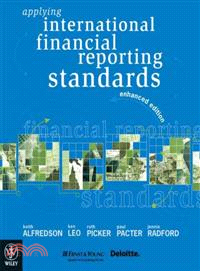圖書簡介Applying International Financial Reporting Standards (Enhanced Edition) contains a number of content revisions as a consequence of various adjustments made to IFRS since their inception in January 2005. Students are required to possess a sound understanding of the financial reporting requirements under IFRS and this textbook remains the only educational resource available to meet student needs. The new enhanced edition will continue to offer students a thorough conceptual overview and practical working knowledge of the financial reporting requirements required under IFRS.
The core focus of the text remains on the interpretation, analysis, illustration and application of the scope and purpose of the financial reporting processes under IFRS. The financial reporting environment has changed considerably over the past 2 years, since the introduction of international accounting standards, and is expected to continue changing for another 3-5 years. The objective of the author team is to ensure that the textbook continues to be up-to-date in accordance with IFRS revisions initiated by the IASB.
This textbook has been written for intermediate and advance financial reporting courses, at both undergraduate and postgraduate level, and aligns with the knowledge expectations of the accounting profession.
* New chapter on Revenue Recognition explores the recognition and measurement of revenues for goods, services rendered and dividends
* New chapter on IFRS 2 Share-based Payment examines the scope for recognising and measuring share-based payment transactions
* New extracts from real world companies included to enable students to apply the intention of the Standard as well illustrate how the Standard translates to the reporting environment.
* International Financial Reporting Standards in the edition include:
* Framework for the preparation and presentation of financial statements
* IFRS 1 First-time adoption of International Financial Reporting Standards
* IFRS 2 Shared based payments
* IFRS 3 Business combinations
* IFRS 5 Non-current assets held for sale and discontinued operations
* IAS 1 Presentation of financial statements
* IAS 2 Inventories
* IAS 7 Cash flow statements
* IAS 8 Accounting policies; changes in accounting estimates and errors
* IAS 10 Events after balance sheet date
* IAS 12 Income taxes
* IAS 14 Segment reporting
* IAS 16 Property, plant and equipment
* IAS 17 Leases
* IAS 18 Revenue
* IAS 27 Consolidated and separate financial statements
* IAS 28 Investments in associates
* IAS 31 Interests in joint ventures
* IAS 32 Financial instruments; disclosure and presentation
* IAS 36 Impairment of assets
* IAS 37 Provisions, contingent liabilities and contingent assets
* IAS 39 Financial instruments; recognition and measurement
* Step by step analysis of the IFRS, its scope, objectives and reporting requirements
* Details the relevant issues and practical workings associated with the selected IFRS
* Illustrative examples positioned throughout the chapters show the new financial reporting procedures and further develop conceptual understanding of the new processes
* Chapters include extracts of international companies to illustrate how real companies are reporting financial data in accordance with the IFRS
* Graded end-of-chapter exercises and problems provide students with numerous opportunities to test their understanding of the financial reporting requirements under the respective standard. For the lecturer, a comprehensive solutions manual provides guidance on the correct procedures for working through the activities.










